Poetic representation of lived and imagined experience of language in exile
Talk by Katrin Ahlgren, Associate Professor of language education at Stockholm University, member of the MIRCo Research Center at the Autonomous University of Madrid and 2024-2025 research-fellow at the Paris IAS (Riksbankens Jubileumsfund Research Chair), as part of the international conference Disparate Narrative Worlds: Crisis, Conflict, and the Possibility of Hope organized by the American Univeristy of Paris and the Université Paris Cité.
Onsite event, open to the public with registration here.
Conference in English.
Presentation
One of the central functions of narratives is the ability to create and shape worlds. Certainly, narratives can also establish competing versions of the world, which sometimes divide persons and groups so deeply that they can appear to be occupying different realities. Disparate narrative worlds are not only a feature of the political landscape, they are also embedded in aspects of daily life where social divisions and patterns of affiliation generate divergent realms of meaning. Moreover, they are represented in literary, artistic and cultural narratives, and can be visible on the political, cultural and private levels, populated by diverse and sometimes segregated groups.
Katrin Ahlgren’s presentation explores the aesthetic possibilities and ethical challenges of poetic representation. It is based on a longitudinal ethnographic study focusing on foreign-born adults who arrived in Sweden at the beginning of the 21st century. Through an epistemological grounding in hermeneutical interpretation, the reconfiguration of oral narratives into written poetic texts is emphasized. Regarding aesthetic considerations, poetic representation relies on the performative ability of poetic language to convey an emotional and embodied understanding of the lived and imagined experience of language in exile. This approach can also promote aspects of linguistic creativity that do not always align with a monolingual standard norm, thus proposing alternative models of speakerhood.
|
|
|
Polyphonic voices: representations of lived and imagined experiences of language in exile 01 September 2024 - 30 June 2025 |
|
|


